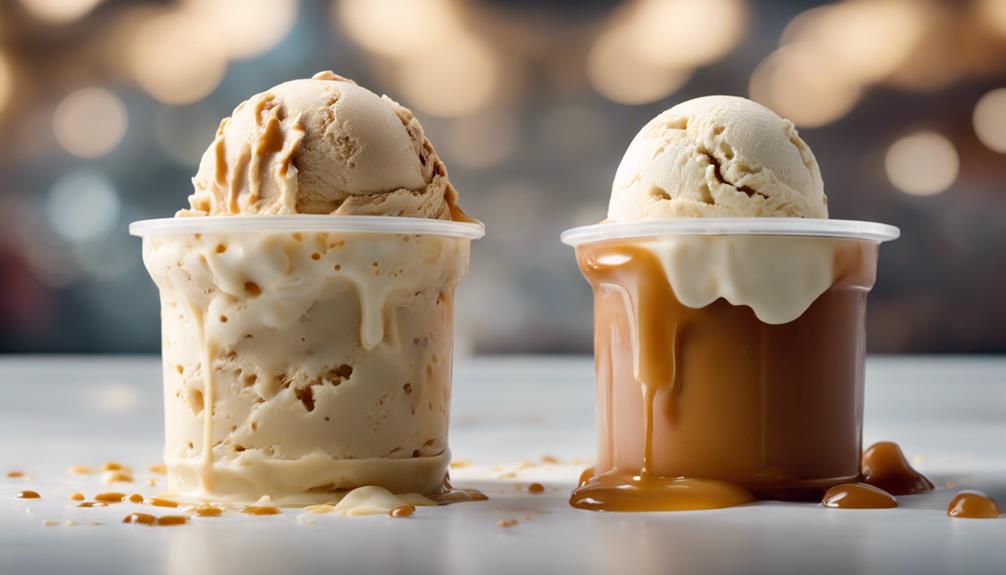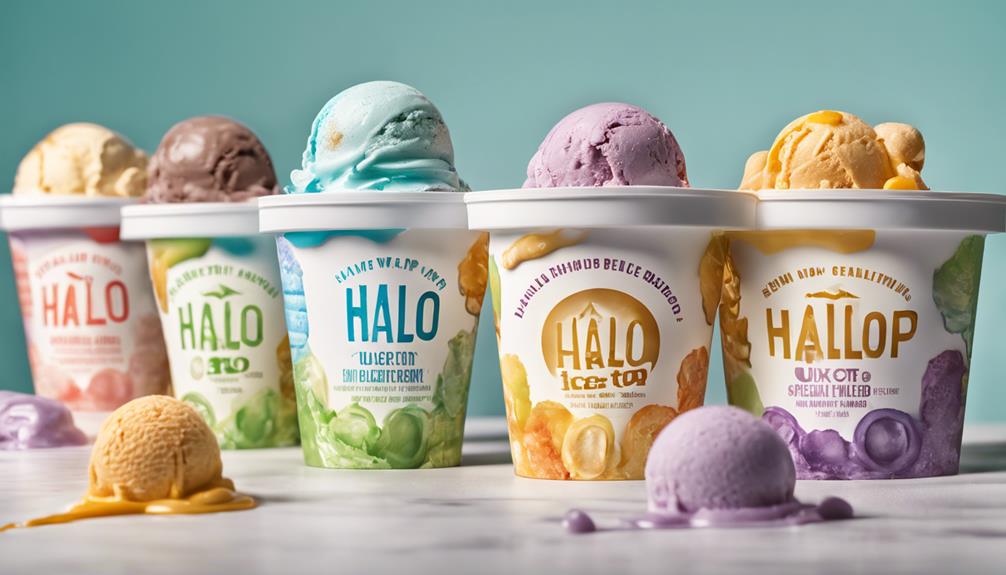For healthier ice cream choices, opt for options sweetened naturally with erythritol, stevia, or monk fruit and low in added sugars. Look for varieties high in protein and made with whole ingredients. Avoid high glycemic toppings like caramel and assess the texture for creaminess and thickness to indicate better quality. Prioritize brands that are known for offering smooth, low glycemic options. By considering these factors, you can select ice cream that is better suited for your well-being.
Key Takeaways
- Opt for ice cream sweetened with erythritol, monk fruit, or stevia.
- Avoid high glycemic sweeteners like cane sugar or high fructose corn syrup.
- Check for additives like guar gum or carrageenan that can spike blood sugar.
- Choose sugar-free or low-sugar toppings to keep glycemic index low.
- Prioritize whole food ingredients and low-glycemic options for better health.
Factors Influencing Ice Cream Choice
When selecting ice cream with a low glycemic index, various factors influence your choice. Consider the sugar content and type of sweeteners present in the ice cream. Higher sugar content and artificial sweeteners can lead to a higher glycemic index, causing rapid spikes in blood sugar levels. Opt for natural sweeteners like erythritol, stevia, or monk fruit, as they've minimal impact on blood sugar.
Moreover, pay attention to the fat and protein content of the ice cream. Higher levels of fat and protein can help slow down the absorption of sugar in your bloodstream, thereby lowering the overall glycemic response. Choosing ice cream made with whole food ingredients and minimal additives can also support better blood sugar control.
Lastly, check the total carbohydrate content per serving. Keeping an eye on the carbohydrates can help you make a more informed decision when managing your blood glucose levels. By considering these factors, you can select ice cream that aligns with your goals of maintaining a low glycemic index.
Key Sweeteners to Look For

Consider opting for ice cream sweetened with natural sweeteners like erythritol, monk fruit, or stevia to minimize the impact on blood sugar levels. Natural sweeteners are a healthier alternative to high fructose corn syrup and cane sugar, which can cause blood sugar spikes. By choosing ice cream sweetened with these natural options, you can enjoy a sweet treat without worrying about drastic effects on your blood glucose levels.
Erythritol is a sugar alcohol that provides sweetness without the high glycemic impact of traditional sugars. Monk fruit, known for its intense sweetness, is a natural sweetener that doesn't raise blood sugar levels. Stevia, derived from the leaves of the Stevia rebaudiana plant, is another excellent choice for those looking to maintain stable blood sugar levels while indulging in ice cream.
When scanning ingredient lists, be cautious of high fructose corn syrup and cane sugar content. Opting for ice cream sweetened with natural alternatives can help you make mindful choices for your overall health and well-being.
Impact of Additives on Glycemic Index

Certain additives found in ice cream, such as guar gum, locust bean gum, and carrageenan, can influence the glycemic index of the product. These thickeners play a role in how quickly glucose is released into your bloodstream after consuming ice cream.
Ice creams that contain added sugars and thickeners are likely to have a higher glycemic index, leading to potential blood sugar spikes. Being aware of the impact additives have on the glycemic index is essential for health-conscious individuals aiming to make informed choices when selecting ice cream options.
Checking ingredient lists for these additives can help you identify ice cream varieties that are less likely to cause rapid spikes in blood sugar levels. By understanding how additives affect the glycemic index of ice cream, you can make healthier decisions that align with your dietary preferences and health goals.
Consideration of Toppings

Choose sugar-free or low-sugar toppings like fresh fruit, nuts, or dark chocolate to minimize the impact on blood sugar levels when enjoying your ice cream. Avoid high glycemic index toppings such as caramel, fudge, or sugary syrups that can cause rapid spikes in blood glucose. Opt for toppings rich in fiber like chia seeds or flaxseeds to slow down sugar absorption. Experiment with natural sweeteners like stevia or monk fruit in homemade toppings for stable blood sugar levels. Consider trying low-glycemic index options like cinnamon, unsweetened coconut flakes, or sugar-free whipped cream to enhance the ice cream's flavor without drastic blood sugar fluctuations.
| Toppings | Benefits |
|---|---|
| Fresh fruit | Low sugar content |
| Nuts | High fiber |
| Dark chocolate | Low-glycemic index |
| Cinnamon | Natural sweetener |
Evaluating Ice Cream Consistency

When evaluating ice cream options for a low glycemic index, take into account the consistency of the product. Low glycemic index ice cream is known for its creamy and smooth texture.
Opt for ice cream varieties that offer a rich and velvety mouthfeel without being overly sweet. A key aspect to keep in mind is the absence of ice crystals or a gritty texture, as these can impact the overall enjoyment of the ice cream.
Look for options that provide a satisfying thickness without feeling watery, as this may suggest the presence of added sugars that can affect the glycemic index. Quality ingredients play a significant role in achieving the desired texture and taste of low glycemic index ice cream.
Brands that prioritize quality ingredients and focus on creating a smooth and creamy product are more likely to offer a better low glycemic index option.
Top Low-Glycemic Ice Cream Brands

When looking for top low-glycemic ice cream brands, consider the impact of ice cream on your health. Ice cream health studies reveal important insights into diet quality and the importance of analyzing research findings.
Make informed choices to maintain better glycemic control and support your overall well-being.
Ice Cream Health Studies
Exploring ice cream health studies, examining the top low-glycemic ice cream brands can provide insight into making more informed choices for your diet. Here are some key points to take into account based on recent research:
- Limited studies make it challenging to definitively determine ice cream's impact on blood sugar levels.
- Ice cream's ultra-processed nature has been associated with a higher risk of non-alcoholic fatty liver disease.
- Dairy fat in ice cream may not offer the same health benefits as other dairy products.
- Consuming ice cream in moderation as part of a balanced diet is unlikely to pose significant harm to your health.
While more research is needed to fully understand the health implications of consuming ice cream, opting for low-glycemic options can be a smart choice for managing blood sugar levels and potentially reducing the risk of certain health conditions. Keep these factors in mind when choosing ice cream products to best align with your health goals.
Diet Quality Impact
Exploring the impact of diet quality on your ice cream choices, consider opting for top low-glycemic ice cream brands that prioritize health-conscious ingredients and lower sugar content. Brands like Rebel, Nubocha, and Enlightened offer options sweetened with natural alternatives like erythritol and monk fruit, focusing on creating ice cream with minimal impact on blood sugar levels.
Nicks Swedish-Style Light Ice Cream and So Delicious Dairy Free Mint Chip Coconutmilk are low-glycemic options that won't spike blood sugar levels, ideal for health-conscious eaters. By selecting ice cream from these top brands, you can enjoy a sweet treat without compromising your dietary goals of maintaining stable blood sugar.
These brands recognize the importance of using natural sweeteners and quality ingredients to provide delicious alternatives that align with your health-conscious choices and help you manage your glycemic index effectively. Make informed decisions about your ice cream consumption to support your overall well-being.
Research Analysis Importance
Analyzing the available research data on top low-glycemic ice cream brands is crucial for making informed dietary choices. When it comes to ice cream, understanding the nuances of research analysis can provide valuable insights into its impact on health. Consider the following points:
- Research Analysis: Limited studies on ice cream's health effects emphasize the importance of thorough research scrutiny.
- Small Portion Sizes: Small portions may not provide conclusive evidence on how ice cream affects health, highlighting the need for in-depth research.
- Ultra-Processed Nature: Ice cream's ultra-processed quality, high in calories, fat, and sugar, raises concerns about its potential health implications.
- Dairy Fat Content: The dairy fat in ice cream may not offer the same health benefits as other dairy products due to the processing involved.
Benefits of Homemade Options

Making your own ice cream at home offers numerous benefits, including complete control over ingredients and the ability to customize flavors and nutritional content. When you opt for homemade ice cream, you have the freedom to control the ingredients that go into your sweet treat. This means you can reduce added sugars and avoid artificial additives commonly found in store-bought options. Moreover, you can amp up the nutritional value of your dessert by incorporating nutritious ingredients like fresh fruits, nuts, or even superfoods.
Homemade ice cream isn't just about what goes into it; it's also a fun activity that can involve the whole family. From choosing flavors to experimenting with different recipes, making ice cream at home can be a creative and enjoyable experience.
In addition, creating your own ice cream allows you to cater to specific dietary preferences or restrictions, ensuring that everyone can indulge in a delicious frozen treat that suits their needs.
Frozen Yogurt Vs. Ice Cream

When weighing your frozen dessert options, comparing the differences between frozen yogurt and traditional ice cream can help you make an informed choice based on your dietary preferences and health goals. Here are some key points to analyze:
- Frozen yogurt: Typically contains probiotics that can benefit digestive health.
- Ice cream: May have lower sugar content compared to some frozen yogurt options.
- Frozen yogurt: Not all varieties are lower in calories than ice cream.
- Ice cream: Can be higher in fat content compared to certain frozen yogurt options.
It's essential to pay attention to the nutritional information on the labels of frozen yogurt and ice cream products.
While frozen yogurt may offer probiotic benefits and be lower in fat, some varieties may contain higher sugar content than traditional ice cream. Make your choice based on your specific health needs and preferences.
Nutritional Impact and Recommendations

When it comes to the nutritional impact of ice cream, considering health studies and the benefits of dairy products can guide your choices.
Be mindful of any existing research gaps surrounding the health effects of ice cream consumption.
Understanding these points can help you make informed decisions about your ice cream selections.
Ice Cream Health Studies
Considering the nutritional impact of ice cream consumption, it's crucial to make informed choices that align with health recommendations. When delving into ice cream health studies, keep in mind the following key points:
- Ice cream consumption is linked to health issues due to its high content of calories, fat, and sugar.
- Nutrition guidelines emphasize the importance of limiting sugar and fat intake, making it essential to opt for ice cream options with lower sugar and higher protein and fiber content.
- Coconut milk, known for its low glycemic index, can be a beneficial ingredient in ice cream for managing blood sugar levels.
- Including natural sweeteners and choosing ice cream with reduced sugar content can help prevent sharp blood glucose spikes and promote overall well-being.
Dairy Products Benefits
Dairy products offer various nutritional benefits that can positively impact your health. Calcium-rich dairy products like yogurt and cheese have been linked to a reduced risk of type 2 diabetes and heart disease.
Unlike ice cream, which tends to be high in calories, fat, and sugar, dairy products provide health benefits without the unwanted additives. Opting for low-fat or fat-free dairy options can help you maintain a balanced diet while still reaping the rewards of calcium intake.
When compared to ice cream, which may not offer the same advantages due to its high calorie content, choosing low-fat dairy products can be a healthier choice.
Nutrition guidelines recommend limiting sugar and fat intake, making dairy products a more suitable option for those seeking to lead a healthier lifestyle.
Research Gaps Ice Cream
Limited research gaps exist regarding the nutritional impact and recommendations for consuming ice cream, making it difficult to provide definitive guidance on its health effects. When considering the health impacts of ice cream consumption, several factors come into play:
- Limited Studies: There's a scarcity of in-depth studies examining the specific health effects of consuming ice cream.
- Ultra-Processed Nature: Ice cream is classified as a highly processed food due to its high calorie, fat, and sugar content, which can have implications for overall health.
- Dairy Fat Concerns: Unlike other dairy products like yogurt or cheese, the dairy fat in ice cream may not offer the same health benefits.
- Research Challenges: Errors in research methodologies and lifestyle factors can introduce biases and confound results when evaluating the health-consciousness of ice cream consumption.
With more research needed to fully grasp the health implications of regular ice cream consumption, individuals aiming to make informed dietary choices should consider these uncertainties.
Frequently Asked Questions
What Ice Cream Does Not Spike Blood Sugar?
When selecting ice cream to avoid blood sugar spikes, opt for options like Rebel Coffee Chip, Nubocha Chocolate Arriba Gelato, So Delicious Mint Chip Coconutmilk, Halo Top, or Enlightened Keto P.B. Cookie & Brownie Dough for a guilt-free treat.
What Is the Healthiest Ice Cream to Eat?
When it comes to ice cream, the healthiest option for you is one that won't send your blood sugar on a rollercoaster ride. Look for choices with natural sweeteners, high fat, and low carbs to keep things steady.
Which Ice Cream Is Best for Sugar Patient?
For sugar patients, the best ice cream options are Blue Bunny, Breyers, Edys, and Halo Top. Consider Halo Top for extra protein and low carbs. Watch carb count, calories, fat, and serving size to manage blood sugar effectively.
Which Ice Cream Has the Least Amount of Sugar?
For the ice cream with the least sugar, opt for Rebel Coffee Chip, boasting less than 1 gram per serving. Indulge guilt-free with this low-sugar treat. Enjoy the creamy goodness without the sugar spike.
Is Low Glycemic Index Ice Cream a Good Option for the Military Diet?
Low glycemic index ice cream can be a good option for the military diet. It provides a sweet treat without causing rapid spikes in blood sugar levels. This can help maintain energy levels and prevent crashes, which is important for those following a strict meal plan like the military diet. That’s why ice cream on military diet can be a smart choice.
Conclusion
Overall, choosing ice cream with a low glycemic index can be a tasty and healthy option for those looking to manage their blood sugar levels.
Did you know that a study found that people who consumed low-glycemic index foods had lower levels of insulin and blood sugar compared to those who consumed high-glycemic index foods?
So next time you indulge in a sweet treat, consider opting for a low-glycemic ice cream for a healthier option!









